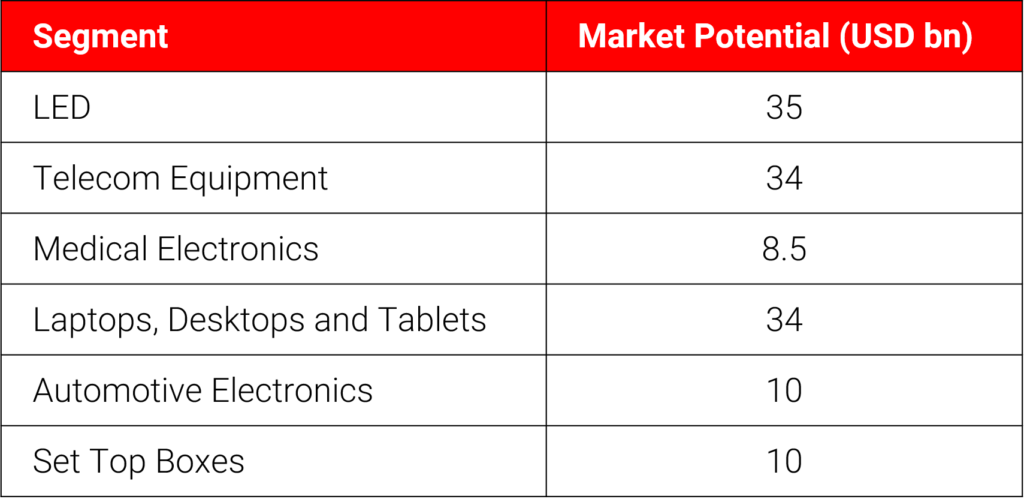National Policy On Electronics: A New Beginning For A New India
To give a brief overview, the National Policy on Electronics (NPE), 2019 is a step taken by the Ministry of Communications and Information Technology, approved by the Cabinet, to improve the global position of the Indian ESDM (Electronic System Design and Manufacturing) industry.
This step was taken in light of attracting foreign investment to elevate the Indian EDSM market’s status as a global hub. As per the policy-makers, this initiative has four major advantages of having a huge market, large talent pool, conducive policy, and low operating costs.
These pillars are charted to increase the industry’s value to $400 billion by 2025 out of which, FDI (Foreign Direct Investment) will be contributing $100 billion and employing around 28 million people as well as boosting advanced and medium technologies on the Indian soil. As per a report, the industry is to be divided into categories where each sector would be propelling the common growth.

How Does It Impact You?
The key features of the National Policy on Electronics 2019 and its impacts on your organization are as follows:
-
Creating an ecosystem to secure a position as the global hub: For the Indian companies, this means relaxed policies and greater technical infrastructure to improve the organizational functioning.
-
Supporting startups: The Electronic Development Funds for Research & Development and Innovation in Electronics is seriously considering supporting startups in the IP generation and Electronics in the ESDM space. This support can be financial as well as resource based.
-
Providing incentives: Manufacturing of core components will be encouraged in India instead of having it imported from other countries. Mega projects will especially be benefited.
-
The National Scheme of MSMEs: Focused on the Micro Small and Medium Scale Enterprises in the ESDM sector, the framework is more appealing to such organizations. Under this, the companies will have the advantage of financial support to promote in-house manufacturing and encourage exporters. This support will be in the form of reimbursements.
-
Investment in research & development: Refined talent through Ph.D. students will help in improving the R&D factors of your organization. The funding for these students will be backed by the Government. Moreover, those willing to establish their testing laboratory will receive investment, of course, upon the implementation of mandatory standards.
-
Skill training & development: Companies can now hire trained and skilled workforce or train them upon hiring, all at the cost of the Government. The scheme will focus on the private sector through two Sector Skills Council – Telecom and Electronics in which the Government will be covering over 75% to 100% of the skill development and training cost, based upon the sector.
Read More On The Brief: Food Processing In India: 2019 Industry Overview, Market Opportunities And Potential
-
Infrastructural development: The Electronic Manufacturing Clusters Scheme outlines the Government’s monetary support in terms of infrastructure and development of common facilities. The scheme will bear the 50% cost for Greenfield clusters (in developing or under developed areas) and 75% cost for the Brownfield Cluster (in significantly developed regions).
-
Ease of availability of land: With the government support, land can be easily available for set up and immediate operations.
-
Subsidy: Modified Special Incentive Package Scheme (MSIPs) provides incentives as a reimbursement of 25% of the expenditure on capital equipment.
-
Incentives for latest technology: Companies deploying the latest technology of AI, Machine Learning, Robotics, and others will also be granted incentives to expand their technical feasibility. This can help companies, especially startups and other MSMEs invest their time in creating new tech-oriented products.
-
Exports simplified: Exporting the domestically manufactured set-top boxes and other products will receive a 2-5% incentive in Focus Product Scheme under Foreign Trade Policies.
-
Sovereign patent fund: Companies can safeguard all of their intellectual properties patents will be under the Government scheme.
The Uplift of Foreign Investment Due to National Policy On Electronics, 2019
As per the recent budget, the 100% FDI in contract manufacturing will make investing simpler for foreign companies to invest in the local or foreign contract manufacturers. This is a giant leap towards the Make in India’s Policy.
The National Policy On Electronics will directly influence the foreign investment in the country. With reduced import costs and backed up amenities, several old and new players of the market are now looking at India as a viable option for their manufacturing & processing functioning. However, the Government will allow Indian companies the first preference in establishing their plants in the Green or Brown Cluster, as per their choice.
Companies like Apple and OnePlus have emphasized on the importance of relaxing the FDI rules for Single Brand Retail Trade (SBRT) which will bolster the vision of expanding the online as well as offline reach for established organizations while paving in way for the new entrants. The flexibility and transparency is the real deal winner in this case.
Wrapping Up
In the hindsight of FDI dropping down by 1 percent ($44.36 million) in FY 2018-2019, this relaxation of FDI bought along with National Policy On Electronics (NPE, 2019) will tip the capital balance in our favor.
Foreign investments are important for the country’s growth and play a vital role in shaping the industrial infrastructure.
Thanks to the new Foreign Investment (potential) entrants in the Indian market, there is a huge potential to strengthen the value of rupee against dollar and also bring in new practices that are at par with the global counterparts.
About The Author

